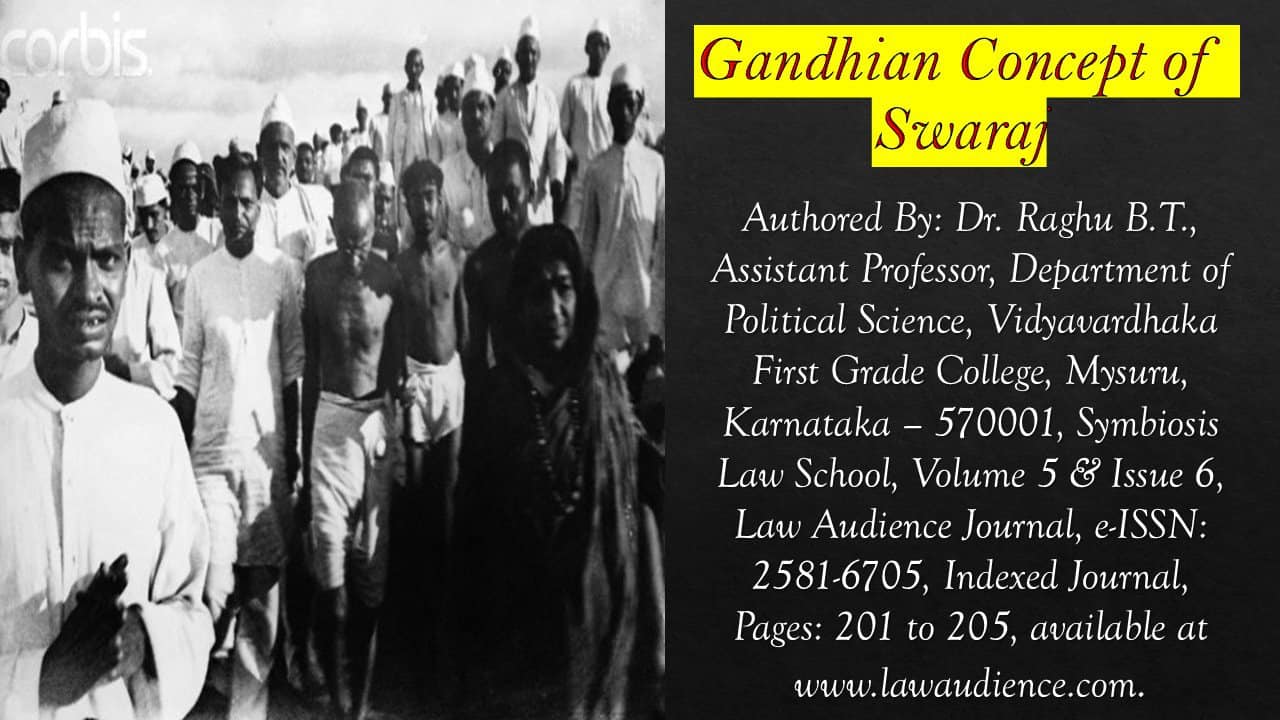Click here to download the full paper (PDF)
Authored By: Dr. Raghu B.T., Assistant Professor, Department of Political Science, Vidyavardhaka First Grade College, Mysuru, Karnataka – 570001, Symbiosis Law School,
Click here for Copyright Policy.
ABSTRACT:
“Mahatma Gandhi was a great supporter of Swaraj. He was an apostle of peace, non-violence and was ardent follower of Purna Swaraj or complete independence. His concept of Swaraj was just like Rama Rajya on kingdom of God on the earth. The aim of this paper is to bring to light the significance of the comprehensive nature of Swaraj propounded by Mahatma Gandhi”.
Keywords: Swaraj, Rama Rajya, Self-Government, Village Swaraj, Parliament.
I. INTRODUCTION:
Swaraj means self – rule and has its source in the ancient Hindu Philosophy. “The word Swaraj”, says Gandhi Ji, “is a sacred word, a Vedic word meaning self- rule and self-restraint, and not freedom from all restraint which ‘independence’ often means.” This in indeed an extension of the word’s application from the sphere of individual morality to that of state. The character of Swaraj will evolve with evolution of the individuals in terms of moral values until it finds its consummation in enlightened anarchy. It cannot, therefore, be described in terms of any one form of society. That is why Gandhi Ji even calls it ‘indefinable’. He once described it as ‘Ramaraj’, i.e., “Sovereignty of the people based on pure moral authority.” “Indeed”, he said, “the word ‘Swaraj’ is all- embracing. It does include complete independence as it includes many other things. To give it one defines meaning is to narrow the Outlook and to limit what is at present happily limitless. Let the content of ‘Swaraj’ grow with the national consciousness and aspirations.”
I.I HISTORICAL AND PHILOSOPHICAL BACKGROUND:
To understand the conceptual framework of Swaraj, it is essential to delve into the historical and philosophical influences that shaped Gandhiji’s thinking. Gandhi Ji was deeply influenced by India’s rich cultural heritage, including its tradition of self-rule and village-level government system. He drew inspiration from Indian spiritual texts such as the Bhagavad Gita and the writings of ancient Indian thinkers, particularly the concept of “Swarajya” from the Kautilya’s Arthashastra. Gandhi Ji was also influenced by Western thinkers such as Henry David Thoreau and Leo Tolstoy, who espoused the ideas of non- violent resistance and self-sufficiency. Thoreau’s essay “Civil Disobedience”, John Ruskin’s “Unto This Last” and Leo Tolstoy’s book “The Kingdom of God is Within You” played pivotal roles in shaping Gandhiji’s Philosophy of Swaraj.
II. SWARAJ AND SELF – GOVERNMENT:
Thus “Swaraj” is infinitely greater than includes independence. But self-government is the primary and essential requirement. As every country is fit to eat, to drink and to breathe, even so is every nation fit to manage its own affairs, no matter how badly. Gandhi Ji defended self- government not merely because it would enhance “the greatest good of the greatest number” but mainly because he believed in the spiritual democracy of mankind. According to Gandhi, “Swaraj of the people meant the sum total of the Swaraj (self-rule) of individuals and so he clarified that for him Swaraj meant freedom for the meanest of his countrymen. And in its fullest sense, Swaraj is much more than freedom from all restraints, it is self-rule, self-restraint and could be equated with moksha or salvation”. ‘Swaraj’ is not inconsistent with a representative system of government and Gandhi Ji defined it in 1925 as the government “by consent of the people ascertained by the vote of the largest number of adult populations, native born or domicile, who have contributed by manual labour to the service of the State….” The Parliament of Gandhiji’s ideal conception would not need the spur of petitions or any other pressure; because the best men, he hoped, would be elected by the people. He was also critical of the demoralisation resulting from the right party discipline. For Gandhi Ji a vote was a matter of duty. In the words of Gandhi Ji, “It must come without the asking.” In fact, Gandhiji’s ‘Swaraj’ consists of a state embracing a society which is dependent on morals, a society which is the embodiment of equality – politically, socially and economically. Gandhi Ji did not want any economic classification or casteism under his concept of Swaraj.
III. GRAMA SWARAJ:
Grama Swaraj is a complete republic, independent of its neighbours for its vital wants. The first concern of every village would thus be to grow its own food crops and cotton. It should also have reserve land for cattle, recreation centres for adults and playgrounds for children. The village would also maintain a village theatre, school and public hall. Education would be compulsory up to the final basis course. As far as possible, every activity would be done on co-operative basis. The Government of the village would be conducted by the Parliament of five persons, annually elected by the adult villagers, male and female, possessing minimum prescribed qualification. They would have all the authority and jurisdiction required to conduct the affairs of the village for its welfare.
IV. ECONOMIC SWARAJ:
Gandhi ji believed that India had lost political control due to losing the control over its economy. In his exhaustive treatise ‘Hind Swaraj ‘he devotes a complete chapter ‘Why was India lost?’. This chapter gives an economic argument for the enslavement of India by the British. It further goes on to give Gandhiji’s vision for a good economic system. Gandhiji’s concept of Swaraj included economic Swaraj which was not separated from human condition in its totally. For Gandhi Ji political Swaraj would not work without bringing about an economic Swaraj. For Gandhi Ji economic development was related to the concept of Swaraj. Economic dependence does not allow individuals or nation to formulate and take decisions for themselves (Swaraj).
V. IMPLICATIONS OF SWARAJ IN CONTEMPORARY SOCIETY:
This section will examine the relevance and potential implementation of Gandhian concept of Swaraj in contemporary society. It will explore the challenge surrounding the realisation of individual and collective self- governance in the face of rapid globalisation, technocratic governance structure, and societal complexity. The paper will also address the potential role of Swaraj in addressing current issue such as political corruption, environment degradation, and socio-economic inequality.
VI. CONCLUSION:
Thus, Gandhi’s aim of totally implementing the concepts of Swaraj in India was not achieved. The voluntary work organisations which he founded for this purpose did serve as precursors and role models for people movements, voluntary organisations, and some of the non-governmental organisations that were subsequently launched in various parts of India. The concept of Swaraj, as envisioned by Mahatma Gandhi, provides a powerful framework for individual and collective self-rule. It emphasizes the importance of non- violence, decentralisation, self-sufficiency in empowering individuals and communities to govern their own lives and shape their destinies. Swaraj continues to hold relevance in contemporary times, offering insights on how to address pressing global challenge and promote freedom, justice and equality. While it may face challenges and critiques, Swaraj service as a reminder of the ongoing struggle for a more just and inclusive society.
Cite this articles as:
DR. RAGHU B.T., “Gandhian Concept of Swaraj” Vol.5 & Issue 6, Law Audience Journal (e-ISSN: 2581-6705), Pages 201 to 205 (16th December 2024), available at https://www.lawaudience.com/gandhian-concept-of-swaraj/.
References:
1. K.K. Bhardwaj – Gandhian Thought” – Sudha Publication (P)LTD, New Delhi.
2. M.K. Gandhi -“The Selected work of Mahatma Gandhi” (Ahmedabad: Navjivan 1969).
3. Dr. S.H. Patil- “Gandhi and Swaraj”- Deep & Deep Publication, New Delhi – 1983.
4. M. P. Mathai, What Swaraj meant to Gandhi ” International workshop on Non-violent Struggles in the Twentieth Century and their Lessons for the Twenty-first, October 1999, New Delhi.
5. B.L. Grover, Alka Mehta, A New Look at Modern Indian History, New Delhi, 2015.
6. J.B. Kripalani – “Gandhi His Life and Thought” Publication Decision- Ministry of Information and Broadcasting, Government of India -1970.
7. V.P. Verma – “The Political Philosophy of Mahatma Gandhi & Sarvodaya ” Publication – Ss Agra, Lakshmi Narayan Agarwal (1965).
8. Gandhi, Mohadev K. – “Autobiography: The Story of My Experiment with Truth. “Translated by Mohadev Desai- Doves Publication – New York.
9. Rajni Kothari, Masses Classes and the state in New Social Movements in the South, Empowering the people, ed. Ponna Wignaraja, Visataar Publications, New Delhi, 1993.
10. J.L. Nehru, The Discovery of India, Bombay, 1962.



